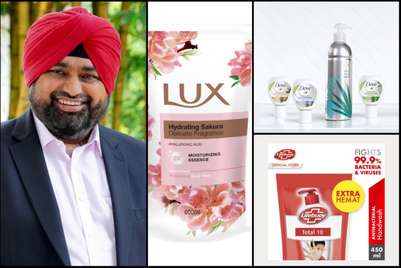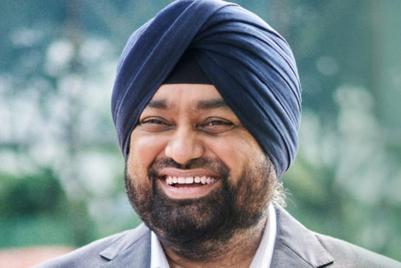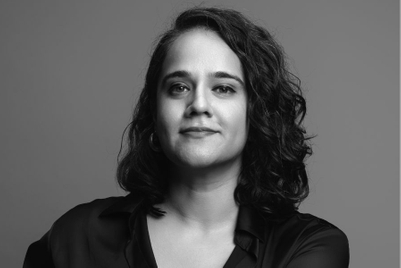
Seeking comfort in joy is an innately human trait. We all love joy. It’s heartwarming and familiar. We love to experience it. Who wouldn’t enjoy being transported to a simple moment that takes away the hustle and grind of reality where our current problems don’t exist? When a brand is able to do that in its marketing effort, it’s the equivalent of comfort food.
Yet, joy and its sibling nostalgia face scrutiny in the modern business landscape, dominated by the era of 'purpose' in advertising. The mandate is to infuse a deeper meaning into every message. In the midst of this shift, Campaign sits down with Samir Singh, Unilever's global CMO for personal care, who sits on an eight-to-10-billion-dollar portfolio of some of the world’s leading personal care brands (Dove, Lux, Lifebuoy, among others). Singh, however, finds his muse in joy.
He fondly recounts the impact of Cadbury's Dairy Milk chocolate during his formative years. "Everyday joy," he asserts, "lurks subliminally, evolving into our fondest memories." From a marketer's perspective, he recognizes its silent yet indispensable role in consumers' lives. The joy delivered by brands like Cadbury's, Lux, or Dove is often taken for granted, but when it falters, so does the consumer experience. Singh believes that preserving this hidden, everyday joy is paramount. It's an almost invisible offering that can be truly transformative.
In this exclusive and wide-ranging interview with Campaign, we delve into the evolving landscape of purpose-driven advertising, the challenges of marketing legacy brands and his biggest fears. Read below.
‘Purpose’ is hot commodity and over the last few years, brands have been in a race to articulate their social purpose. Is it the job of brands to save the world and fight for the greater good? What’s wrong with just making a sale without attaching a deeper meaning to it?
Brands can talk about purpose in an elevated way when they have earned that right. Like saving lives, Lifebuoy scaled up its education programmes to highlight the importance of handwashing in saving lives or what Dove has done to enable self-esteem in young girls because those brands have earned the right to talk about purpose in that authentic manner. The purpose of Lux is to make people feel and look attractive on a daily basis, day after day, year after year, decade after decade. For an FMCG product that translates to delivering billions of experiences every day in a perfect end-to-end manner that gives consumers joy. That, for me is very important and you can deliver only when you have credibility and authenticity.
Lux is over a century old this year. It is available in over 100 countries and is a market leader in fragrance skincare cleansing brands. As a CMO, what is it like to helm a legacy brand? How do you protect it while prepare it for the future at the same time?
Legacy is always a tricky word because it suggests as if a brand is sort of old. We look at the legacy of Lux in a very positive way—it was invented as the beauty soap of glamourous film stars in 1924. One hundred years on, it is still the leader of the soaps category in the developing and emerging markets across Asia, Africa and LATAM.
As a marketer, it is crucial to stay true to the heritage and core but keep updating, innovating and evolving. You have to protect the past and transfor for the future. This means evolving how we speak to women and what the brand [Lux] stands for. For many women in Asia, Lux is the only fragrance they have. So how can it become an ally for its consumers and overcome sexist judgments to be the voice of modern femininity.
Consumers are more and more choiceful about where they spend their time and dollars. As a marketer, what are the challenges in ensuring brand relevance and engagement with the consumer?
I think the challenges are what you face in the category.
FMCG is flooded with new competition, sometimes very strong local competitors too. Another is premiumisation. The category is always premiumising. New channels like e-commerce are getting more powerful.
Generative AI: it is our biggest opportunity and our biggest challenge. I'm a glass-half-full kind of guy, I tend to think of it in terms of how it can enable marketing not just by becoming more efficient, which is the immediate goal, but also by becoming more creative. To sort of liberate creativity at a level that would not be possible by the coming together of machines and humans to do something which is wonderful, entertaining and valuable. And we're working with sort of generative AI in both ways, across a whole raft of marketing disciplines, to elevate our game.
As a CMO, the biggest test is your brands and messages not getting noticed and lost in the noise. Navigating the clutter in the mind space of the consumer who is overwhelmed by the number of messages she gets is also a critical challenge. Frankly, she [the consumer] is not always looking for a soap to deliver a meaningful message when there are so many products talking to her, so many ideas and developments hurled at her.
As a marketer, it is important to stand out of that clutter, and Lux has successfully done that primarily because of how it understands its consumers and talks to them. It’s memorable in its unapologetic expression of femininity and for being proud of every facet of femininity.
We’ve been able to engineer a brilliant turnaround with Lux. It was growing in the low single digits for a larger part of the decade and now it is growing in high double digits for the last three years and winning market share whatever it is.
Explain this business revival and business growth of Lux a little more.
So, from 2010 to 2020, Lux faced the challenge of a low CAGR [compound annual growth rate] of 3.6% and share losses. This was primarily due to a decline in product quality and a one-size-fits-all approach. So, in mid-2020, we embarked on a transformative journey and made strategic decisions to bring back skincare to our bars, retained the focus on fragrances in liquids, and significantly invested in product quality. We focussed on elevating product superiority. So from 25% products superior to competition we are now at 100% products superior to the competition in our key markets.
We had to disaggregate the brand in our biggest markets. Talk to consumers in China differently from consumers in India, and that is different from the approach applied in Indonesia.
In China, the tone is more elevated on smashing labels. While in India, we are still able to leverage the amazing positioning that we've had as the film soap of the stars and talk about romance with celebrity brand ambassadors like cricketer Virat Kohli and [wife and Bollywood A-lister] Anushka Sharma. The stories are much more intimate and romantic. The tonality is different, but the larger sort of brand imagery that comes out from these tonalities is still the same.
Innovation and premiumisation were also key. Skinnification is a growing trend—our premium ranges, such as Lux Botanicals, participate in high-growth segments and new formats, such as scrubs and foams. We have tall glow and fragrance claims on our soap bars and we constantly have to innovate to deliver on them.
The result of these strategic changes was a remarkable turnaround. A staggering 12% USG [underlying sales growth] from 2021 to 2023. We not only regained market shares and penetration but also witnessed the resurgence of our brand power.
Gen Z attention or holding on to loyalty—what’s the top priority?
We respect loyalty among existing consumers, but younger consumers are absolutely a top priority. You cannot just build a brand through loyalty among your existing consumers and Lux wouldn't have survived if it wasn’t for young people in different eras endorsing it. All legacy brands grow by getting newer and younger consumers into the fold. And to get those newer and younger consumers, you must position yourself as the brand that is meaningful to them. It’s not about jumping onto a trend; Gen Z takes to personality to get hooked.
You will be surprised to learn that in Asia, brands like Lux, Lifebuoy and Dove are some of the most used brands, more than any new phone or a social media app. People interact with these brands more than a billion times a day. And they have a powerful role to play.
For a woman living in a small Mumbai chawl [slum] with a family of eight, the fragrance of her soap carries weight. Many times, that’s the only fragrance she has and when she steps out of the house, that lingering scent becomes an assertion of dignity. It means a lot to her. That’s really the purpose of a brand like Lux and that’s how a humble soap becomes bigger than just being a soap.
Well explained, and I notice how you constantly refer to your consumer as female. But now with growing gender fluidity and androgynous influences in fashion and skincare, is that something you want your brands to explore?
Lux is the voice of empowered femininity, which is very important to the product. But I think, in terms of the offering, we are a soap bar or a body wash and, therefore, quite democratic in our appeal to everyone and across ages, ethnic backgrounds, and even genders.
Let’s shift gears here. You’ve been at Unilever for 25 years. They say it’s important for successful leaders to have that outsider’s perspective, but 25 years is a really long time with one company. How do you maintain that start-up mentality?
By staying connected to younger people and not taking myself very seriously. Mistakes are as important as success; be aware of both. I’m proud of the work I’ve done and there’s learning from the work I couldn’t do.
The organisation is full of amazing young talent who bring a different cultural attitude to the table. There is so much to learn from them.
Finally, I think it’s essential to be connected to people outside your work sphere—ultimately, Unilever and FMCG are just one particular way to do business—there are so many other business models that are admirable and inspirational.
Name one that particularly inspires you.
It’s cliched but it has to be Apple. They have brilliant marketing, and they pack it with ruthless consistency. Whoever said product advertising is boring needs to look at Apple.
I'm also a big fan of KitKat and Coca-Cola. They’ve been around for 100 years and are still relevant, topical, and cool. They remind me of some of the great Unilever legacy brands.
(The interview has been edited for brevity and clarity.)
(This article first appeared on Campaign Asia)


.jpg&h=334&w=500&q=100&v=20250320&c=1)
.jpg&h=334&w=500&q=100&v=20250320&c=1)
.jpg&h=334&w=500&q=100&v=20250320&c=1)


.jpg&h=334&w=500&q=100&v=20250320&c=1)




.jpg&h=268&w=401&q=100&v=20250320&c=1)


.png&h=268&w=401&q=100&v=20250320&c=1)
.jpg&h=268&w=401&q=100&v=20250320&c=1)



